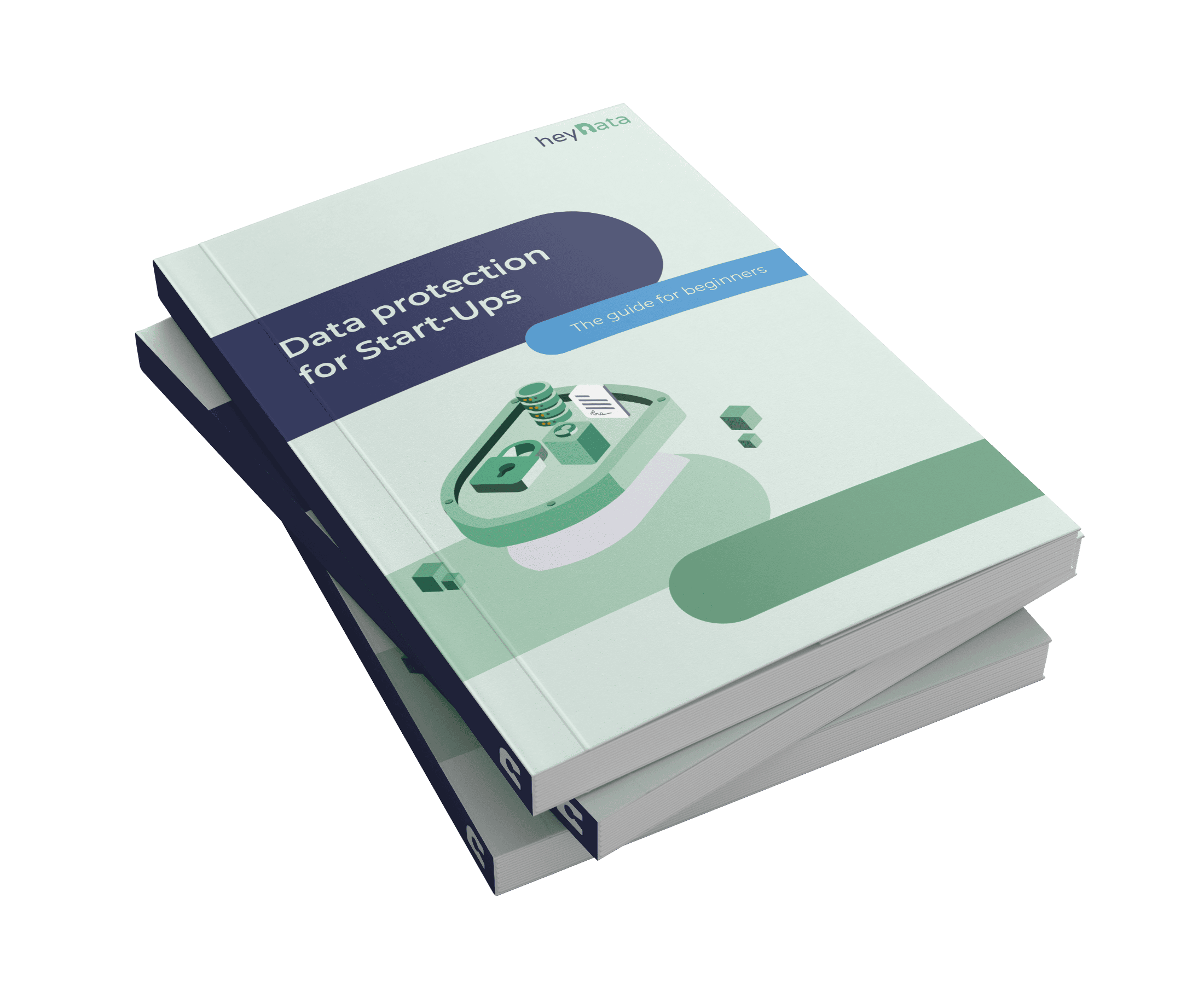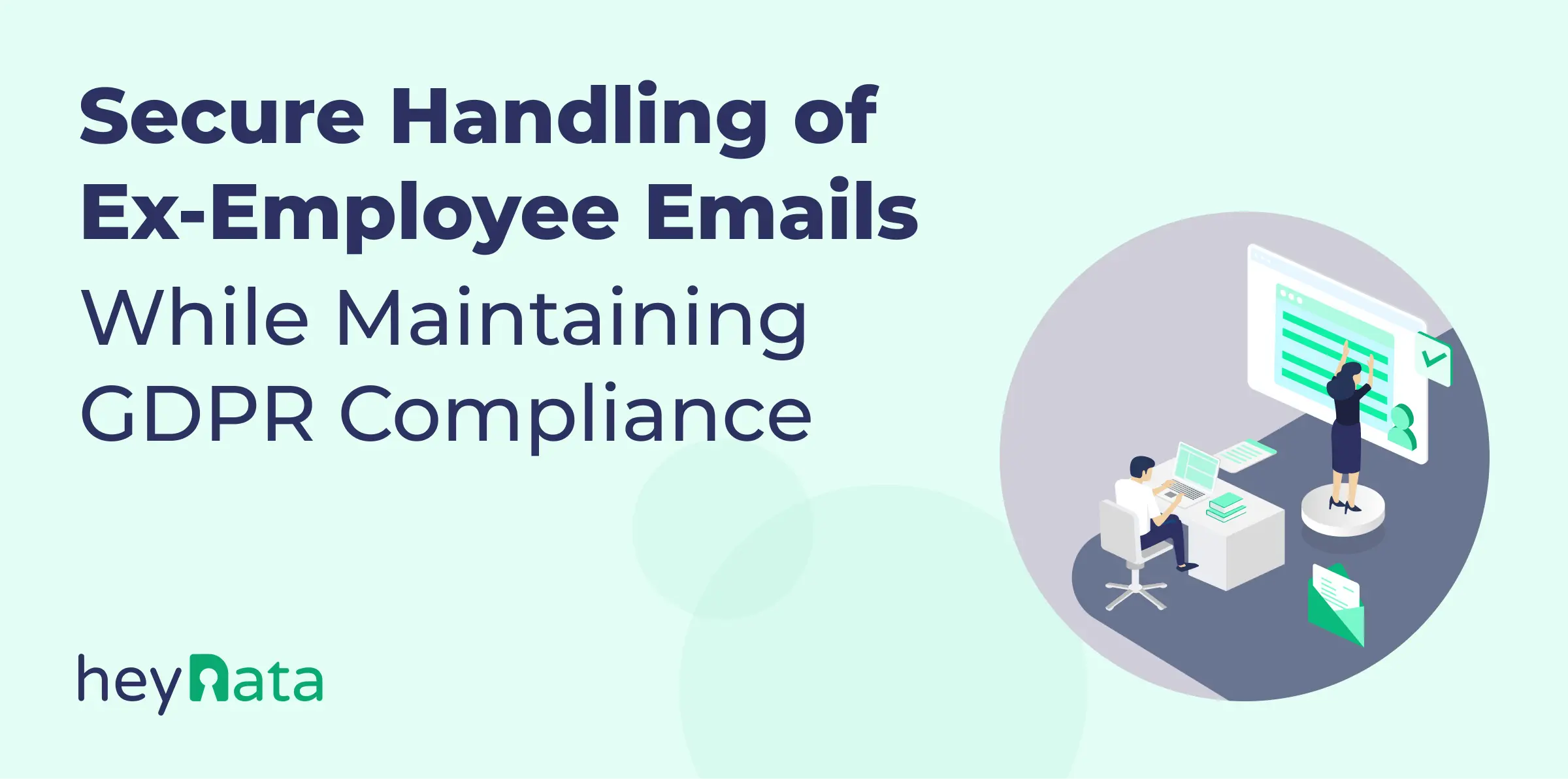
Worried about managing data protection while scaling your startup?
Our whitepaper reveals how to make data privacy your competitive edge.

Secure Handling of Ex-Employee Emails While Maintaining GDPR Compliance
'%3e%3cpath%20d='M26.6667%2020.022L30%2023.3553V26.6886H21.6667V36.6886L20%2038.3553L18.3333%2036.6886V26.6886H10V23.3553L13.3333%2020.022V8.35531H11.6667V5.02197H28.3333V8.35531H26.6667V20.022Z'%20fill='%230AA971'/%3e%3c/g%3e%3c/svg%3e) What is this all about?
What is this all about?
- Ex-employee email accounts must be deactivated promptly to comply with GDPR storage limitation principles.
- Keeping inactive email accounts for too long can lead to fines, reputational damage, and legal risks.
- Organizations should define clear policies for email access and retention after employment ends.
- Appointing a Data Protection Officer and regular employee training helps ensure ongoing compliance.
Learn how to properly manage ex-employee email accounts in accordance with data protection regulations such as the GDPR. This guide outlines best practices to ensure legal compliance, protect sensitive information, and avoid potential risks such as fines or data breaches. Discover practical steps organizations can take to securely handle email data after an employee leaves.
Table of Contents:
Handling Ex-Employee Email Accounts Under GDPR
When an employee leaves a company, their email account contains valuable data such as communication history, contacts, and potentially sensitive information. While it may seem practical to preserve this data for possible future use, it is essential to understand the correct legal approach: the solution is to delete or properly manage the mailbox data.
The Belgian Data Protection Authority ruling clarified this issue in a case highlighting the necessary actions regarding the duration for which an ex-employee’s mailbox can remain active and employer access to its contents. In 2020, a company was fined €15,000 for mishandling former employee email accounts. Specifically, the company kept email accounts linked to former employees (using their first and last names) active for 2.5 years before closing them.
According to the Belgian DPA’s decision and guidance, failing to deactivate such email accounts after employees leave breaches fundamental GDPR principles. The violations included:
- Lawfulness: No valid legal basis justified retaining the email data that long.
- Purpose Limitation: The data was kept beyond the original purpose for which it was collected.
- Data Minimization: Retaining full access to the entire mailbox was excessive.
- Storage Limitation: The duration of data retention was unreasonable.
This ruling serves as an important guideline for companies on managing former employee data in a GDPR-compliant manner. Proper handling not only protects sensitive information but also supports seamless handover of ongoing business communications and relationships.
Employers should therefore implement clear policies to deactivate and delete ex-employee email accounts promptly after their departure, retaining data only for as long as legally necessary and justified.
Employee Post-Employment Best Practices
How an employer manages the departure and supports the departing employee can significantly impact both parties' experiences. Post-employment practices are essential for maintaining a positive relationship between employers and former employees. Here are some best practices for employers to follow:

Worried about managing data protection while scaling your startup?
Our whitepaper reveals how to make data privacy your competitive edge.
| Immediate Account Deactiva-tion | Promptly block the ex-employee's email account upon their effective departure from the company. |
| Departing Employee Notification | Before deactivating the account, inform the departing employee. This allows them to organize and forward their private emails to their personal email address prior to leaving. |
| Implemen-tation of Automatic Reply | Implement an automatic reply indicating the departure of the individual and providing alternative contact details instead of automatically forwarding emails. This method is preferred, as seen in the case reviewed by the DPA. |
| Deactiva-tion Timeline Flexibility | Deactivate the email address and automatic message after a reasonable period, typically one month. However, considering the ex-employee's role and responsibilities, an extension up to three months could be justified. Any extension should be agreed upon mutually with the ex-employee or at least communicated to them. |
| Limited Duration Account Preserva-tion | Preserve the email account for a limited duration based on the company's legitimate interests, especially to ensure business continuity and proper functioning. |
| Essential Email Retrieval | Retrieve essential emails necessary for the company's operations or in order to comply with legal retention periods from the employee's account before their departure and with their presence to avoid ongoing access requirements post-departure. |
Post-Employment Legal Considerations
Data Privacy Laws and Compliance
It is essential to adhere to local and federal privacy laws, including regulations like the GDPR (General Data Protection Regulation), which dictate how personal data must be handled, stored, and processed. Organizations should fully understand these laws and how they apply to their data practices. In some cases, specific regulations require retaining certain emails for a defined period.
Company Policies and Agreements
Clear company policies should govern the management of ex-employee email accounts. Any agreements made with employees regarding access to data after their departure must be respected. It is important to regularly review and update these policies to stay aligned with evolving laws and organizational needs.
External Data Protection Officer
Business owners should consider appointing a Data Protection Officer (DPO), either internally or externally, to ensure ongoing compliance with regulations like the GDPR. DPOs provide valuable expertise, help identify data protection risks, deliver privacy training, and keep the organization informed about regulatory changes.
Employee Training and Awareness
Employee training on data privacy is critical. It educates staff on the importance of protecting personal data, the risks associated with data breaches, and steps to safeguard information. For example, heyData offers a comprehensive employee awareness program covering topics such as the risks of leaving sensitive data in email accounts and other privacy best practices.
Final Notes
Managing and accessing the email accounts of ex-employees is a delicate balance between data security, legal compliance, and ethical responsibility. Following clear policies, respecting privacy laws, and having a structured approach ensures a smooth transition while safeguarding sensitive information.
With these strategies in place, companies can effectively manage employee departures while prioritizing data security and legal compliance, ensuring a seamless transition for both departing employees and the organization.
Frequently Asked Questions
Q: How long should a company keep an ex-employee’s email account active?
A: The company should deactivate and delete the account promptly unless laws or policies require longer.
Q: Can a company access an ex-employee’s email contents?
A: Only if it follows privacy laws like GDPR and company policies.
Q: What risks arise if ex-employee email accounts are not properly managed?
A: Risks include fines, data breaches, reputational damage, and loss of trust.
Important: The content of this article is for informational purposes only and does not constitute legal advice. The information provided here is no substitute for personalized legal advice from a data protection officer or an attorney. We do not guarantee that the information provided is up to date, complete, or accurate. Any actions taken on the basis of the information contained in this article are at your own risk. We recommend that you always consult a data protection officer or an attorney with any legal questions or problems.


